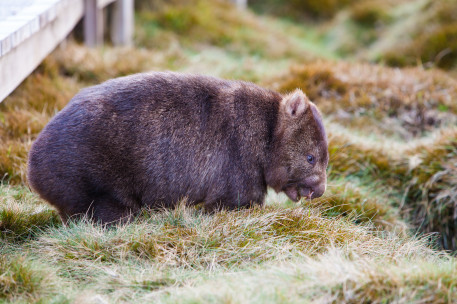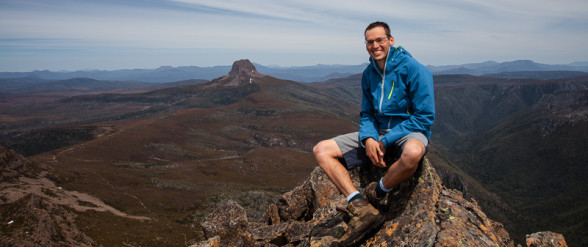Cradle Mountain. Start of the famous Overland Track, a five to seven day hike. The weather statistics for this region are even less promising than for the rest of Tasmania: “Cold, wet weather is the rule in the Cradle Valley area where out of ten days it rains an average seven days, is cloudy eight days, and the sun shines all day on only one day. It snows 54 days each year, and even in summer, blizzards are not uncommon.” Hoping for the best I set off early in the morning.
I had two days in the area, so the plan was to hike the first leg of the Overland Track to Waterfall Valley and spend the night at the hut. And it actually seemed that the weather god was trying to make up for the bad weather that I had had along the coast a few days earlier: blue skies and bright sunshine greeted me once again.

I hopped off the park shuttle at Ronny Creek. From there, a wooden boardwalk winds through button grass and the occasional forest past the small waterfall of Crater Falls, ascending higher and higher until you reach Crater Lake. An old boat shed provided a great spot for a second breakfast.

From there it was a steep hike uphill to the crater’s rim past a series of great lookouts. The blue color of Crater Lake looks just fantastic from up high but you really have to earn it on the way up.

Just before the ascent is finally coming to an end there is Marion’s lookout from where you get a great view of Lake Lila and Dove Lake as well as the rugged peaks of Cradle Mountain.

Here the track flattens a bit and takes you past crystal-clear alpine tarns and even some snow closer and closer towards Cradle MOuntain. The views of its rugged towers get better and better as you approach it, until you need a very wide lens to capture the entire Mountain in one single photo.
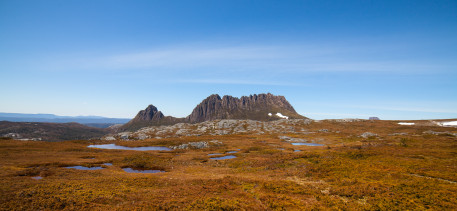
You also start to get nice views of the tower of Barn Bluff in the distance.

I dropped my heavy backpack at the intersection where the summit track turns left and started the climb to the summit. After a gentle beginning it gets steeper and rougher the higher you get, until you find yourself scrambling across large rocks for the last half hour or so.

There was still a lot of snow just below the summit and most people actually didn’t dare to venture across the sometimes steep snowfield but rather stayed clear of that slightly trickier section.

Those who did continue onward were rewarded with great views from the summit at 1545m. I could see all the way to Mt. Jerusalem in the distance where I had been just two days earlier.
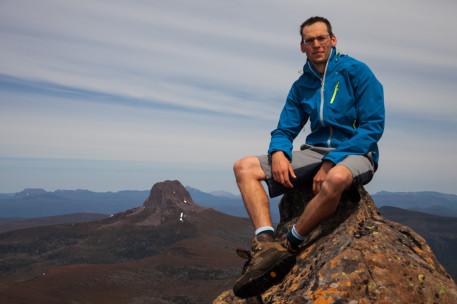
I walked around the summit plateau for a bit and enjoyed the views to all sides. Although it is not an overly high mountain, it still feels very alpine and exposed and it’s easy to see why Cradle Mountain is such a popular destination in Tasmania if not the icon of the state.
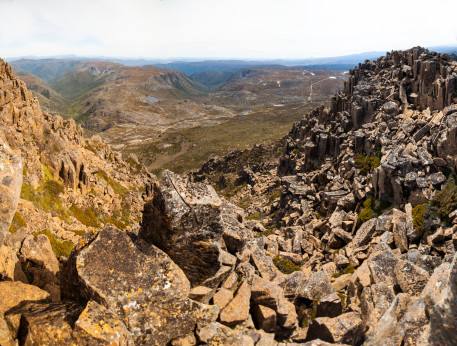
Up high the wind was really cold and it slowly started to cloud over. I also still had a fair bit to go that day and so I soon descended back to where I had left the pack. A little further ahead I stopped for lunch, enjoying the solitude as there wa sno other hiker around.

While Cradle Mountain was now showing its less dramatic south face, the very distinct tower of Barn Bluff grew taller as I neared Waterfall Valley.
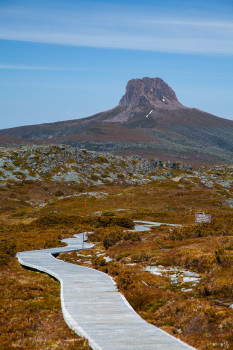
The track now followed mostly wooden boardwalks across flat terrain, before descending down into the valley.

Aside from the original hut there is also a newer, bigger huts now. When I arrived in the afternoon there were only two people in the new hut and I took the opportunity for a quick dip in the nearby river. A Tasmanian wild hen watched me warily as I splashed around in the freezing water.
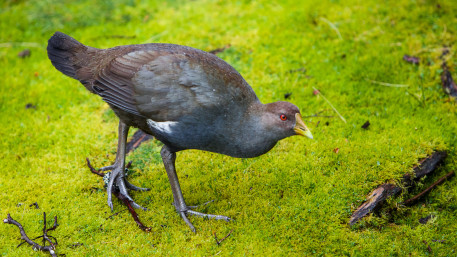
I knew that as a day hiker without an Overland Track permit I was not allowed to stay in the huts (I actually learned later that I wasn’t allowed to stay anywhere in Waterfall Valley at all). However it didn’t get overly busy and the ranger didn’t want to send me back but let me stay.

Since I had carried the tent all the way from the car park I initially debated whether to camp or sleep in the hut. A lot of hikers had meanwhile flocked in but no-one actually stayed in the hut. Eventually I couldn’t be bothered to set up the tent and stayed inside. A good choice as it turned out: during the night it started to rain and didn’t stop anymore at all. The morning was grey and wet and the weather went back to normal. I waited a bit but the weather didn’t improve so I started the walk back.

It didn’t take very long and I was soaked. The footpath was slippery and flooded so that I ended up walking in a stream of water that had developed along the track. Then the wind picked up and almost blew me right off the ridge into Dove Lake. But I made it back to the car in one piece and oh wonder – as soon as I opened the door, the sun came out and within a few minutes the sky was as clear as if nothing had ever happened. I hadn’t really stopped at all on the way back and it was only around noon. Plenty of time to go back, take some more photos and hunt down a wombat or two!

I spent the afternoon walking around Dove Lake since I hadn’t had the chance on the first day.

Earlier I had already spotted a wombat near the main road when I took the park shuttle, so I went back to Ronny Creek once again to look out for them.
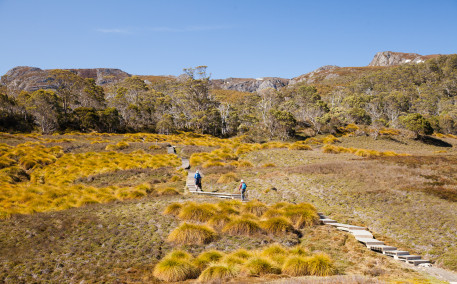
It didn’t take long to spot them; in fact they were everywhere! Seeing them move clumsily through the grass, it was actually hard to believe that the can turn into vigorous tanks, at nearly 40 km/h basically overrunning whatever gets in their way. One cheeky bugger sat right underneath the boardwalk. Someone should have explained to him the meaning of “hiding” – whenever he saw someone coming, he tucked under the wooden planks, but somehow forgot that his rear end was still sticking out quite a bit. And wombats have large butts!
